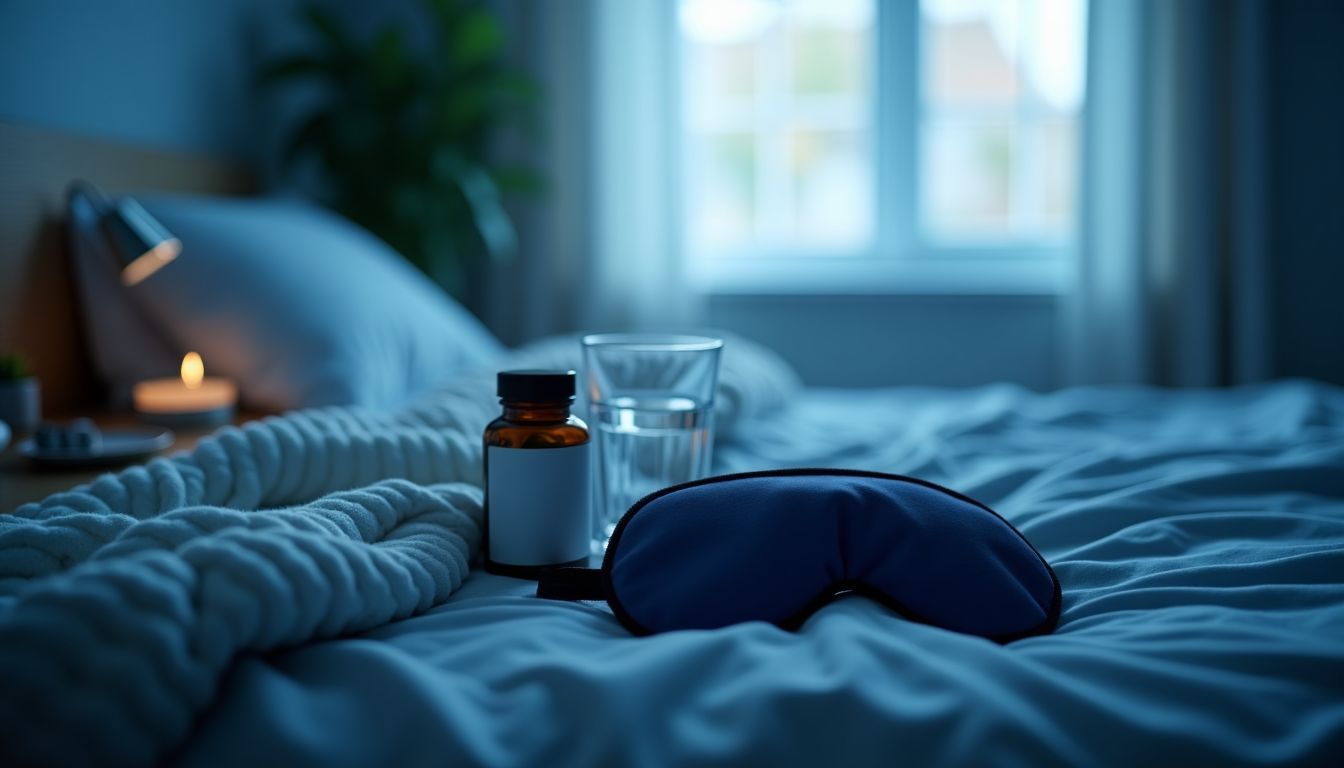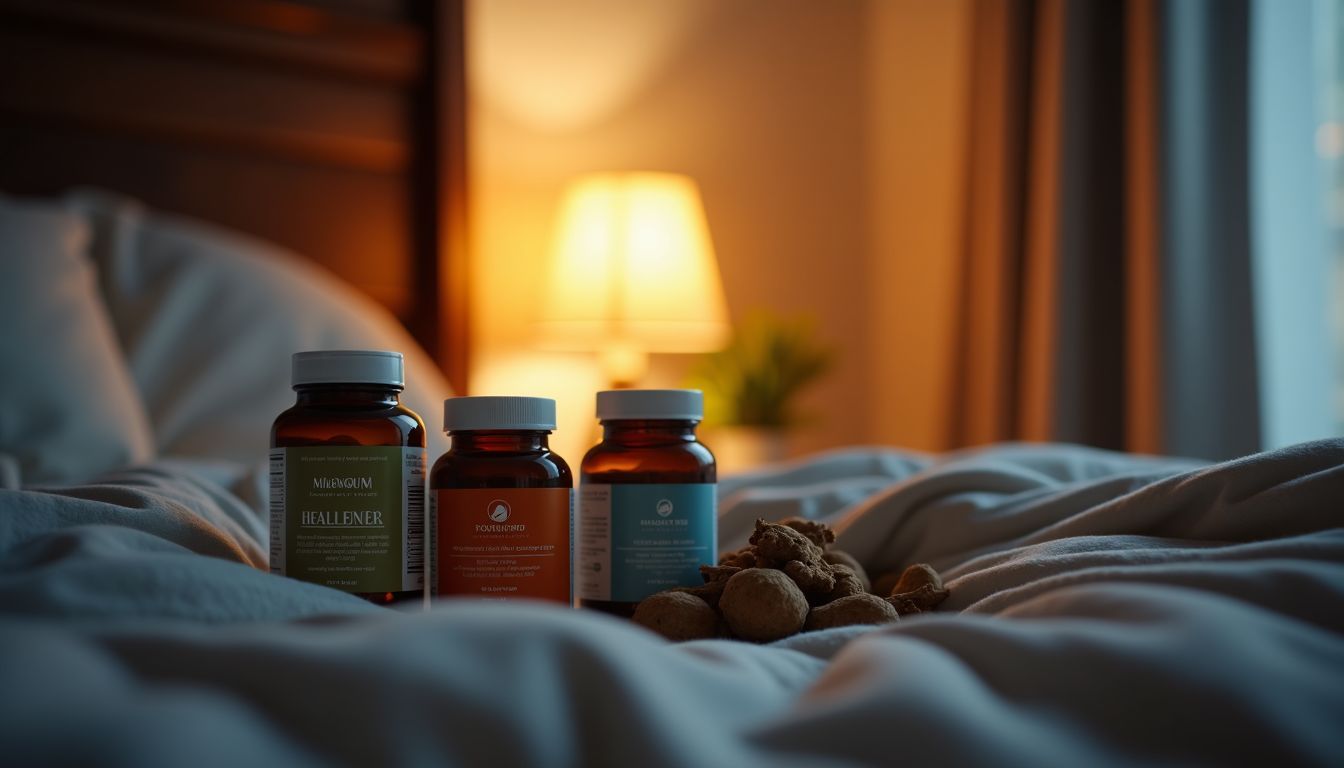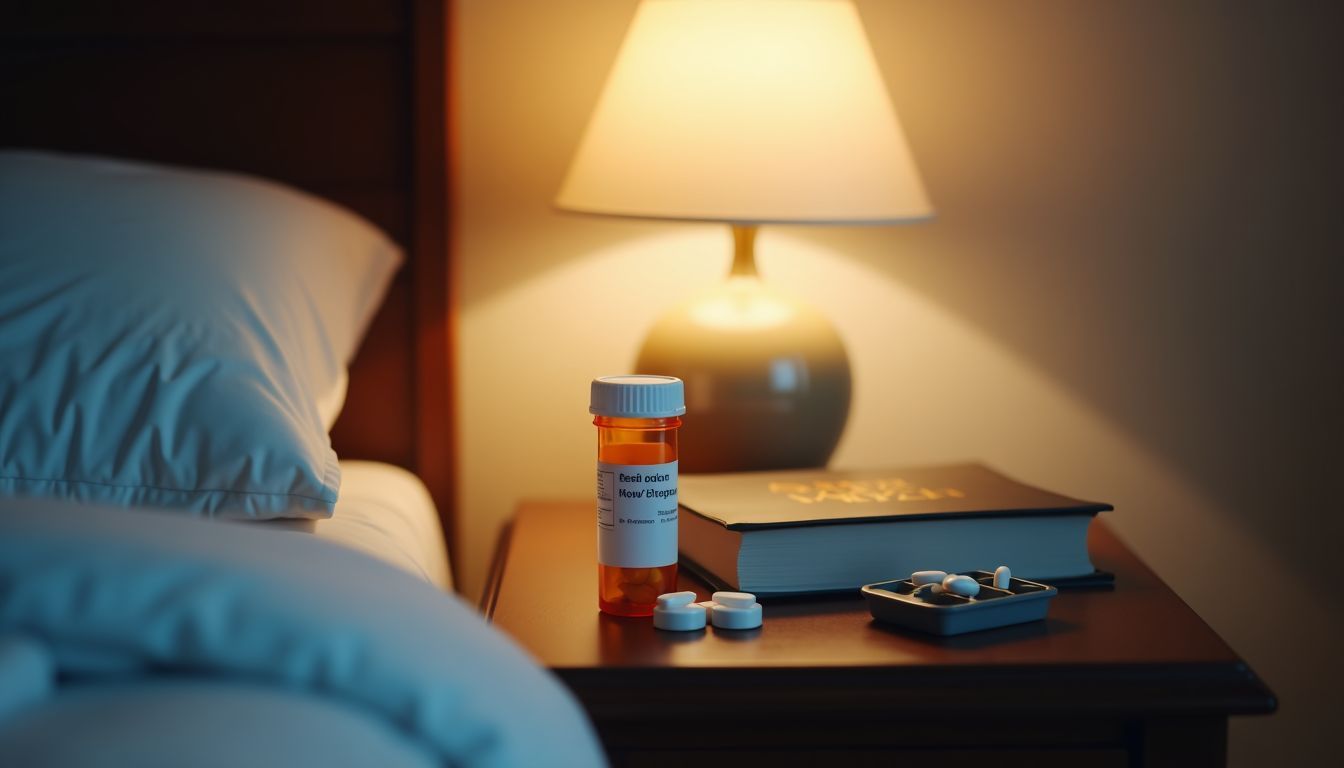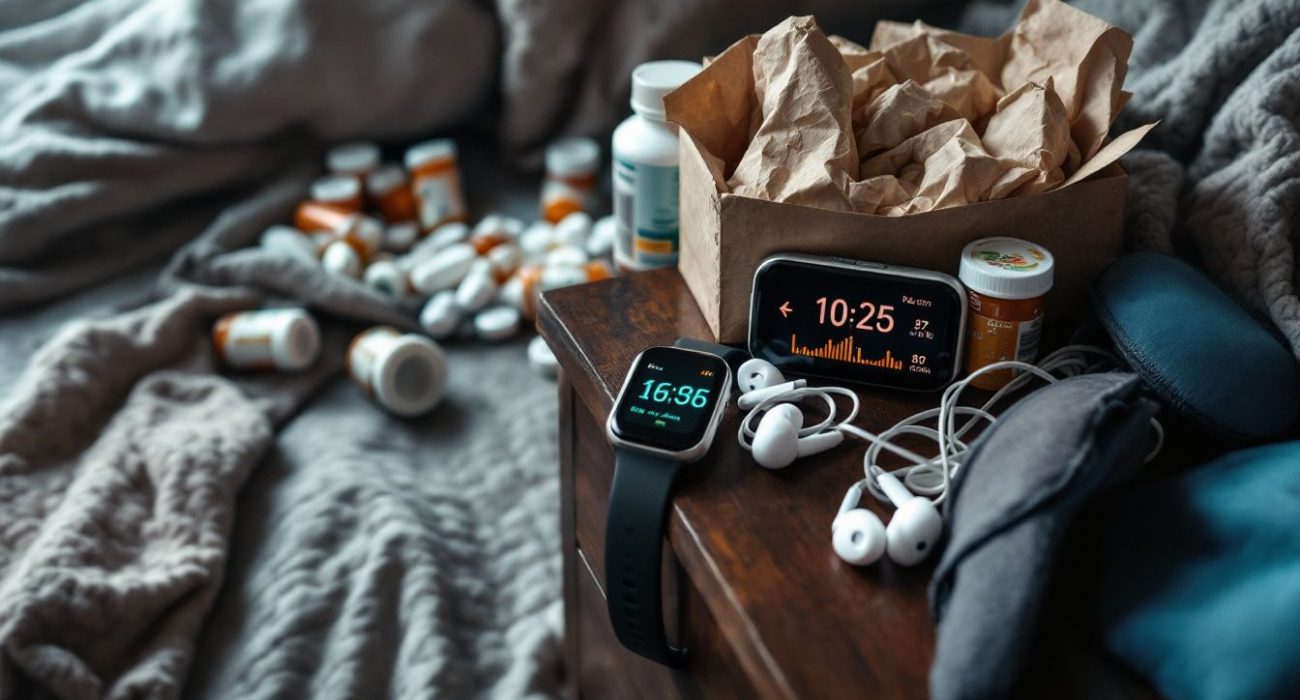Many people find it hard to sleep. A fact is, not all sleep aids work the same. This blog will cover evidence-based sleep aids to help you rest better. Keep reading to learn more.
Types of Sleep Aids

Sleep aids come in different forms, such as prescription medications and over-the-counter options. Natural supplements and behavioral interventions are also considered for improving sleep quality.
Prescription Medications
Doctors give prescription medications to people who have trouble sleeping. These drugs are for those with serious sleep problems. They include Z-drugs, orexin receptor antagonists, benzodiazepines, and melatonin receptor agonists.
Over 8% of adults take these drugs at least four times a week. This is common among older adults.
These medicines work in different ways to help you sleep. Some make you feel calm and sleepy before bed. Others stop the brain signals that keep you awake. People must get them from a doctor because they can cause side effects or become habit-forming if not used right.
They are powerful tools for fighting sleep disorders but need careful use under medical advice.
Over-the-Counter (OTC) Options
Most sleep aids you can buy without a prescription have antihistamines. These are Diphenhydramine and Doxylamine. People choose these for quick fixes to sleep problems like insomnia symptoms or jet lag.
You don’t need to go to a doctor to get them. They are easy to find in pharmacies and cost less than prescription drugs.
Store-brand options work the same as the big-name brands but save you money. Whether it’s sleeping pills or natural remedies, checking with a healthcare provider is smart before starting any new OTC medication.
This way, you avoid bad reactions with other medications you might be taking.
Natural Supplements
Moving from over-the-counter options to natural supplements, these come as plant-based or vitamin and mineral helpers. They are not checked by the FDA for safety or how well they work.
This means people need to be careful when choosing them. About two-thirds of American adults have tried melatonin, a popular choice.
Natural sleep aids include things like dietary supplements and essential oils. These products can help with sleep but lack official approval. Users should research carefully before trying them out for issues like sleeplessness or insomnia.
Behavioral Interventions
After exploring natural supplements, we see another way to help sleep: behavioral interventions. These methods do not need pills or medicine. Instead, they focus on changing habits to improve sleep.
Cognitive Behavioral Therapy for Insomnia (CBT-I) is a strong tool in this area. Experts recommend it for people who have had trouble sleeping for a long time.
CBT-I helps by teaching skills to break the cycle of bad sleep habits and worry about sleep that keep you awake at night. It includes practices like setting a regular bed and wake-up time, finding ways to relax before bedtime, and improving your bedroom environment for better sleep hygiene.
These steps can make a big difference in how well you rest each night without reaching for medication.
How Sleep Aids Work

Sleep aids work by targeting sleep hormones, promoting relaxation and stress reduction, and blocking neurotransmitters to help individuals fall asleep faster and improve the quality of their sleep.
To understand more about how these mechanisms can benefit your sleep, continue reading.
Targeting Sleep Hormones
Melatonin is a key hormone that helps manage our sleep-wake cycles. Our bodies make it naturally when it gets dark to help us fall asleep. Many people use melatonin supplements if they have trouble sleeping.
These supplements can be especially helpful for shift work disorder or adjusting to new time zones. But, taking too much can lead to headaches, feeling sick, and being sleepy during the day.
Doctors often suggest small doses of melatonin for better sleep because it has fewer side effects than other sleep medications. It’s important not to take more than your doctor says.
This way you avoid problems and get the most benefit from this natural sleep aid.
Relaxation and Stress Reduction
Sleep aids can aid in relaxation. L-Theanine promotes tranquility and enhances sleep quality. Some resort to Valerian for improved sleep, but it could lead to headaches or weakness.
These strategies are aimed at reducing stress and preparing your mind for sleep.
Employing relaxation techniques is also essential for maintaining sleep hygiene. Methods such as deep breathing or meditation can alleviate stress prior to bedtime. This simplifies the process of drifting off to sleep and remaining asleep throughout the night.
It’s a component of managing your complete health, enabling you to circumvent sleep issues and feel rejuvenated.
Blocking Neurotransmitters
Some sleep aids work by stopping certain chemicals in the brain called neurotransmitters. These chemicals help send messages between nerve cells. When these are blocked, it can make you feel sleepy.
For example, antihistamines used as over-the-counter sleep aids do this. But using them a lot can make them less effective over time.
Antihistamines like diphenhydramine and doxylamine have calming effects because they block these neurotransmitters. However, evidence shows that they might not work well for everyone and can lead to needing more to get the same sleepy effect.
This means people could become too used to them, making it hard to sleep without them.
Evidence-Based Natural Sleep Aids

Natural sleep aids like melatonin, magnesium, L-theanine, and valerian root have been proven to help improve sleep quality based on scientific evidence. These remedies target specific pathways in the body to promote relaxation and support the natural sleep-wake cycle without some of the potential side effects of prescription medications.
Melatonin
Melatonin is a sleep hormone your body makes. It helps you fall asleep. People use it for jet lag, insomnia, and even autism. Pregnant women or those with menopausal symptoms find it helpful too.
But, melatonin can make some medicines work less well. It might also cause headaches, nausea, and make you sleepy during the day.
Doctors say taking melatonin at the right time can really help your sleep problems. But they also warn to not use too much. The FDA does not watch over this supplement like other drugs.
This means you should talk to a doctor before starting melatonin, especially if you already take other medicines or have health issues like heart disease or obesity.
Magnesium
Magnesium is a natural supplement that helps you sleep. Studies show doses range from 225 to 729 mg. But, the safe daily limit is 350 mg. This mineral can make your body relax and get ready for sleep.
If you take too much, it might cause diarrhea. People with kidney disease need to talk to a doctor before taking magnesium.
This brings us to L-Theanine next.
L-Theanine
L-Theanine is a substance found in tea that helps with relaxation and improves the quality of sleep. It’s safe for children with ADHD, and the recommended daily dosage can be up to 200 mg.
This natural supplement has been proven to promote better sleep quality.
L-Theanine, commonly found in tea, aids in promoting relaxation and improving sleep quality. The recommended daily dosage is up to 200 mg and this natural supplement is considered safe even for children with ADHD.
Glycine
Glycine is an amino acid that can help you sleep by lowering your body temperature. The recommended dosage is 3 grams before bed, and it’s usually safe to take up to 0.8 grams per kilogram of body weight.
This natural supplement falls under the category of evidence-based natural sleep aids and has been found to be effective in aiding relaxation and promoting better sleep.
Glycine can be a helpful addition to your routine if you struggle with sleep issues such as insomnia or sleep disturbances. It’s important to consult a healthcare provider before starting any new supplement, especially if you have chronic conditions or are taking other medications.
Glycine is one of the many options available for those seeking non-pharmacological solutions for sleeping problems and can be a valuable part of addressing insufficient sleep or chronic insomnia without resorting to prescription medications with potential side effects.
Valerian Root
Valerian root is derived from plant roots, with the standard dose being 300-600 mg approximately an hour before bedtime. Some individuals may experience morning drowsiness after its consumption.
Nonetheless, the evidence regarding its sleep benefits is inconclusive. Valerian root may form part of natural supplements or herbal combinations.
CBD (Cannabidiol)
CBD, also known as cannabidiol, is a compound derived from the cannabis plant. It has gained attention for its potential to aid sleep in people with insomnia, anxiety, PTSD, and chronic pain.
Studies show that cannabinoids like CBD may help improve total sleep time and reduce sleep disturbances. However, it’s important to note that while CBD might offer benefits for sleep improvement, there are risks associated with THC dependence and withdrawal-related sleep issues when using cannabis products.
Moving on to the next section discussing “Effectiveness of Prescription Sleep Aids”…
Effectiveness of Prescription Sleep Aids

Prescription sleep aids like benzodiazepines and non-benzodiazepine hypnotics affect sleep by targeting specific neurotransmitters in the brain. However, they can lead to dependency, daytime drowsiness, and potential interactions with other medications.
It is essential to weigh these risks against the benefits when considering prescription sleep aids for managing sleep issues.
Benzodiazepines
Benzodiazepines are prescription sleep aids. They can lead to dependency and tolerance.
Non-Benzodiazepine Hypnotics
Non-benzodiazepine hypnotics are often used to help people sleep. They can lead to daytime drowsiness and interact with other medications.
These are some of the key entities relevant to the topic: Sleep Aid, Zolpidem, Eszopiclone, Zaleplon, Sleep Disturbance.
Orexin Receptor Antagonists
Orexin receptor antagonists are a type of prescription sleep aids. They work by targeting neurotransmitters associated with wakefulness. These medications are used to treat sleep disorders and can help regulate the sleep-wake cycle.
Orexin receptor antagonists have been studied as a potential treatment for insomnia and have shown promising results in clinical trials.
When it comes to drug administration, orexin receptor antagonists play a significant role in addressing sleep medicine needs. These medications aim to balance circadian rhythms and assist individuals struggling with sleep deprivation.
In recent years, this class of medication has gained attention due to its potential benefits in managing various sleep-related issues, including those related to postmenopausal women and individuals suffering from conditions such as sleep apnea.
Risks and Side Effects
Using sleep aids may lead to dependence and tolerance, causing daytime drowsiness and potentially interacting with other medications. To learn more about this, read the full blog post.
Dependency and Tolerance
Dependency on sleep aids can develop over time, particularly with medications like benzodiazepines. This means the body becomes used to the presence of the drug and may require higher doses for the same effect.
Tolerance may also lead to reduced effectiveness of antihistamines as a sleep aid.
These risks indicate that individuals should be cautious when using sleep aids, especially those prone to dependency or tolerance effects such as benzodiazepines and antihistamines.
Daytime Drowsiness
Diphenhydramine and Doxylamine can lead to daytime drowsiness. Around 80% of people who use them experience lingering drowsiness. This means feeling tired or sleepy during the day after taking these medications at night.
These drugs are found in some over-the-counter sleep aids, often used by people for occasional insomnia problems. However, it’s important to be aware of the potential for daytime drowsiness when considering these options as a remedy for sleep issues.
Interactions with Other Medications
Before taking any sleep aid, it’s vital to consult with a healthcare professional about potential interactions with other medications. This is because the safety and effectiveness of nonprescription sleep aids are not entirely understood, which could lead to adverse reactions when combined with other drugs.
Interaction risks might include over-the-counter medications like antihistamines or herbal supplements, potentially causing unwanted side effects or reducing the effectiveness of certain medications.
It’s important for individuals to divulge all their current medications – both prescription and over-the-counter – as well as any herbal supplements they are taking when discussing sleep aids with their healthcare provider.
Safety of Over-the-Counter Sleep Aids
Over-the-counter sleep aids vary in safety and effectiveness. Understanding the potential risks and side effects is essential for those seeking safe and reliable options.
Antihistamines
Antihistamines such as Diphenhydramine and Doxylamine have side effects like daytime drowsiness, dry mouth, constipation, and urinary retention. These are not recommended for individuals with closed-angle glaucoma, peptic ulcers, urinary retention issues or those who are pregnant, breastfeeding or over 65 due to potential risks like dementia.
Herbal Blends
Herbal blends are mixtures of different plants, often used as natural sleep aids. Some common ones include valerian, lavender, and passionflower. Valerian has conflicting evidence of benefits and may cause side effects like headache and weakness.
Lavender and passionflower show promise, although research is limited. These herbal blends are available over-the-counter in various forms such as teas or supplements.
When considering the right herbal blend for better sleep, consulting a healthcare provider is important to ensure safety and effectiveness. Avoiding long-term usage of herbal blends can help prevent dependency and tolerance issues that may arise with prolonged use.
It’s recommended for individuals to assess their individual needs carefully before including any herbal blend into their bedtime routine.
Moving on from the discussion about Herbal Blends – let’s explore Non-Pharmacological Sleep Solutions.
Common Misconceptions
Many people think that natural sleep aids are always safe because they are “natural.” However, it’s important to note that natural sleep aids lack FDA validation for safety or efficacy.
This means consumers need to be diligent in researching and understanding these products before using them. Another common misconception is that store-brand sleep aids are not as effective as branded ones when, in fact, they often contain the same active ingredients at a lower cost.
It’s essential to carefully consider the facts and FDA regulations surrounding both natural and store-brand sleep aids before making assumptions about their safety and effectiveness.
Non-Pharmacological Sleep Solutions
Cognitive Behavioral Therapy for Insomnia (CBT-I) and sleep hygiene practices are effective non-pharmacological ways to improve sleep. They focus on changing thought patterns and behaviors, promoting healthy sleeping habits.
Cognitive Behavioral Therapy for Insomnia (CBT-I)
Cognitive Behavioral Therapy for Insomnia (CBT-I) is a recommended treatment for ongoing sleep problems. It focuses on changing thoughts and behaviors that affect sleep. The American Academy of Sleep Medicine discourages over-the-counter aids and dietary supplements like melatonin and valerian for treating insomnia, emphasizing CBT-I’s effectiveness.
Insomniacs might find relief through Cognitive Behavioral Therapy for Insomnia (CBT-I), a method targeting negative thought patterns and behaviors that hinder sleep. The American Academy of Sleep Medicine advises against over-the-counter sleep aids, including melatonin and valerian root, backing CBT-I as an effective alternative.
Sleep Hygiene Practices
Transitioning from the behavioral aspect of sleep to the practical, sleep hygiene practices play a vital role in promoting quality rest. Simple adjustments, like removing electronic devices, reducing caffeine intake, and sticking to consistent sleep schedules can significantly impact the quality of one’s sleep.
These are common recommendations that align with maintaining a regular schedule, avoiding caffeine and naps during the day, finding time for exercise, minimizing screen time before bed, managing stress levels throughout the day.
Maintaining these routines and habits contributes to good sleeping patterns and aids in preventing insomnia or other related disorders. Creating an environment conducive to relaxation helps signal your mind that it’s time to unwind.
For instance: avoiding electronics near bedtime can lead to better sleep due to decreased exposure to blue light which interrupts melatonin production- a hormone pivotal in regulating our internal clocks.
Also recommended is limiting caffeinated drinks especially closer towards bedtime as they may hinder falling asleep quickly or staying asleep through the night due to their stimulating effect on your body for several hours after consumption.
Relaxation Techniques
Relaxation techniques can help enhance sleep. Methods such as deep breathing, progressive muscle relaxation, and visualization can promote a sense of calm and reduce stress prior to bedtime.
These approaches have been shown to decrease anxiety levels and support better sleep quality. L-Theanine, a natural supplement, is known for its relaxation-promoting properties, specifically in enhancing sleep quality without inducing drowsiness or unwanted side effects.
Similarly, integrating cognitive-behavioral therapy for insomnia (CBT-I) may significantly improve the ability to relax before bedtime and enhance overall sleep patterns.
Incorporating these relaxation techniques together with evidence-based natural sleep aids like L-Theanine can be an effective strategy for individuals grappling with sleep issues. This holistic approach is aimed at reducing stress levels related to poor sleep patterns and fostering a more restful night’s sleep, all without relying on prescription medications or over-the-counter drugs.
Choosing the Right Sleep Aid
When selecting a sleep aid, consider your specific needs and consult a healthcare professional for guidance. To learn more about choosing the right sleep aid, read the full blog.
Assessing Individual Needs
Evaluating what you need for sleep is crucial. It varies for each person. Some individuals encounter difficulty falling asleep, while others experience nocturnal awakenings. Some individuals may have both challenges.
You may have to examine the reasons behind your poor sleep. Stress or anxiety can impede sleep. If your mind is agitated, relaxation methods might be beneficial.
Your healthcare provider can also offer assistance. They can discuss your routines and any health issues that could be impacting your sleep.
Keep in mind, only resort to sleep aids for a brief period if absolutely necessary.
Consulting a Healthcare Provider
Before trying any new sleep remedy, consult a healthcare professional. It’s important to seek their assessment for potential allergic reactions and medication interactions. Moreover, persistent sleep troubles may necessitate behavioral therapy or lifestyle adjustments, which health professionals can effectively guide.
Avoiding Long-Term Usage
Using sleep aids for an extended period can result in issues. It might lead to you feeling drowsy and unwell, akin to experiencing a hangover. It’s essential to bear in mind that sleep aids are intended solely for short-term use when you’re experiencing difficulty sleeping.
Prolonged usage can be detrimental.
Conclusion
In wrapping up, sleep aids can be helpful but aren’t a fix for all sleep problems. Natural remedies like melatonin and valerian have potential benefits but may also have side effects.
It’s important to consult with a healthcare provider before using any sleep aid, whether it’s natural or prescription. Be cautious of the risks and side effects that come with both over-the-counter and prescription sleep aids.
Lifestyle changes are often the best approach for better sleep quality.

